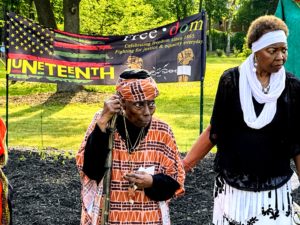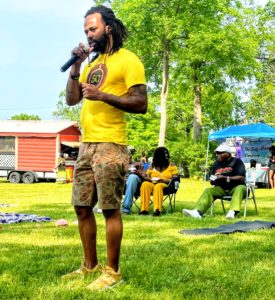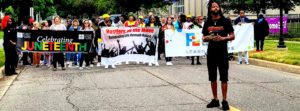By Canisha Bell
As local Juneteenth events wrapped up, two community leaders actively involved in area celebrations reflected in interviews with East Village Magazine on what it all means.
Community organizer April Cook-Hawkins said she believes that Juneteenth events can bring healing to a racially divided city.
“I’m a woman of God, and outside of prayer, we must continue to fight the good fight and have community conversation so that all voices are heard and we can help each other,” said Cook-Hawkins, leader of Beecher’s first annual Juneteenth Parade and Festival. Considering what she wants community leaders to learn from the first celebration, she said, “It’s going to take a community to keep this going. We’ve celebrated 4th of July forever — so that same spirit should echo when it comes to Juneteenth.”
DeWaun Robinson, chairman of the Traditional Flint Juneteenth Committee and president of Black Lives Matter Flint, agrees. “Juneteenth is a tradition, it’s a holiday we need to educate our young people about: about our sacrifices, our contributions to civilization, our history — uplifting the spirit of our ancestors,” he said.
“And it’s vital for us to really practice our own tradition and be of our own culture,” he added. “Far too often we celebrate July 4th and the other different holidays, but there’s never no real substance about us, any legacies that we have put forth to this country and to this world, so Juneteenth of course signifies struggle.”
Flint began celebrating Juneteenth over the course of 11 days with a stream of events, beginning with a kickoff event June 10 at Sarvis Park and ending June 19 with a Freedom Day festival at Max Brandon Park, a parade down MLK Boulevard to Riverbank Park for an Afrobeats party.
While Cook-Hawkins was organizing the first ever Beecher Juneteenth celebration, DeWaun Robinson has been involved with Flint’s observances for many years, starting with the Traditional Juneteenth Flint committee founded by Dr. E. Hill [Mother] Deloney, for the past decade. He’s been the chair of the committee for the past seven years.
What does Juneteenth celebrate and honor?
The Emancipation Proclamation went into effect in 1863, freeing enslaved African-Americans. However, all those who were enslaved weren’t immediately free. Freedom finally came for the more than 200,000 African Americans still enslaved in Galveston Bay, Texas, two years later June 19, 1865, when 2,000 Union troops arrived announcing the end of slavery by executive decree. This day became known as Juneteenth, celebrating the fact that all enslaved African Americans were freed.
Beecher’s First Annual Juneteenth Parade and Festival
Juneteenth was celebrated the weekend of June 19 in Beecher with its first annual parade and festival. The series of events, organized by Cook-Hawkins, began Friday with a basketball game, Beecher’s alumni versus the current state champions. Both games went into overtime and created a lot of energy with the current state champs ultimately winning.
The next day began with a parade starting on the corner of Neff Street and Coldwater Road in front of the Susan P. Bell Community Park and ran down Coldwater ending at Beecher high school. It was here at the Beecher high school football field the festival took place on the Beecher football field. Proceeds from the event went to a fundraiser for the New Beecher High School.
Cook-Hawkins had been putting on Juneteenth events in Flint since 2018, but this is her first year hosting the events in Beecher. One thing she’s learned about hosting events in the community is that the community wants a part in planning the events, to have a seat at the table.
“Usually the community is never asked to come to the table with big events — they just show up, right? But we allow them to have a seat at the table so that we can see what the community really needs.
“The Beecher community is a family knit community and they are excited. There hasn’t been any negative pushback, nothing but positive thoughts and people wanting to get involved. This is the first year in Beecher and I chose to do it in Beecher because, one, they are doing a fundraiser for the new high school and I figured this is the best time to get the community involved and do it as a celebration with Juneteenth and also because I’m an alumni of Beecher…
“I’m always working in Flint and this would give me the opportunity to help where I graduated from,” she continued. “The superintendent wants to make this (Juneteenth Celebration) an annual thing and really start annual events out there… Beecher is kind of left out of the scene of things and nothing really happens out there. So we’re just trying to bridge them back in and make it marry the right way,” Cook- Hawkins explained.
Thinking back to when she was a student at Beecher High School, she recalled, “The [Juneteenth] parade means a lot to me. I remember coming out of Beecher and the homecoming parades and things of that nature that really nestled the community together, and we would be really excited to see the parade come down Coldwater Road. Although we couldn’t make it huge this year with floats and everything, I am really looking forward to seeing all the people come out and just support and love on each other.”
Proceeds from ticket sales and the festival will go to the fundraiser for the high school. Organizers also still are looking for funders. “We’re looking for those who want to pour into Beecher or just support Beecher, from community residents to community organizations,” Cook- Hawkins explained.
Recalling the first time she remembers celebrating Juneteenth, Cook-Hawkins said, “It was when I was little and went to Arkansas, I remember celebrating Juneteenth there, that’s when I learned about Juneteenth…”
“There are several Juneteenth events. The Juneteenth that we have is more of the celebration portion, it’s starting with bringing people together. Starting with the basics of community gathering and bringing people together. God keeps telling me ‘get them there’. Once we get them there then the educational portion will trinkle in,” she says.
51st Annual Traditional Flint Juneteenth Celebration
“When I first started getting involved with Mrs. E. Hill Deloney and Juneteenth, I remember the Freedom Fund Youth Dinner, ” DeWaun Robinson recalls. “It was like a marquee moment — you see all these young people facilitating the program from top to bottom.

Mrs. E. Hill Deloney (left) and Jowanne Carrigan (right) at the Juneteenth celebration. (Photo by Canisha Bell)
“I just saw how elegant they spoke and how knowledgeable they were about Juneteenth — these are students who come up in freedom school, so, just to see them exemplify everything our ancestors expected us to be, right, you know, I just appreciate that,” he said, reflecting on first getting involved with traditional Juneteenth committee in Flint.
“That left a lasting imprint on me and kind of motivated me to get involved.” he said, noting that the traditional Juneteenth committee has been putting on Juneteenth events for 51 years in Flint and Genesee County and has garnered a number of community partners and funders.
“So we do have a number of different funding sources — big shout out to United Way of Genesee County, Community Foundation of Greater Flint, Macy’s — those folks we get community grants, they’ve been participating for a long time. Big shout out to Sloan Museum Longway Planetarium
“We have some real concrete community partners that really has helped us continue on with Juneteenth and continue to sponsor and support and fund and provide grants so that we can carry out these days. We did 11 days this year so it takes a lot of resources to make that happen.
“We’re grateful for the folks that believe in the mission — these nonprofits and charitable organizations are true genuine partners,” Robinson said. “They’re involved all day long…so we really appreciate that. Everybody might not be on the front lines or educating about it, but the way that you stop structural and systemic racism is really being very dedicated and diligent about your actions.

DeWaun Robinson speaking at Juneteenth 2023. (Photo by Canisha Bell)
“Juneteenth is a tradition, it’s a holiday we need to educate our young people about our sacrifices, our contributions to civilization, our history — uplifting the spirit of our ancestors.
“And it’s vital for us to really practice our own tradition and be of our own culture,” he added. “Far too often we celebrate July 4th and the other different holidays, but there’s never no real substance about us, any legacies that we have put forth to this country and to this world, so Juneteenth of course signifies struggle.
“It’s the independence day for African American people. Our people should know that. People see it celebrated and have a good time, but never know the true history behind it. All of the activities that lead up to us being physically free and all of the prolific figures that played a part in making it happen,” he said.
“So when we talk about the Emancipation Proclamation signed by Abraham Lincoln, it wasn’t because he wanted to do that. He was forced by the Civil War soldiers who played a part in forcing his hand.
“There were a lot of Black folks fighting in the [Civil] war but don’t get credit for it. You don’t even know their names, don’t know their stories — they’re not even in the history books. We have to tell those stories. And not just we started in slavery and we came from Africa, no, we populated this whole world and that’s empowering.
“When I went to Egypt and visited Haiti and understood all of the things that we’ve done, even before the stories of America, that’s valuable and I appreciate that, it’s near and dear to my heart — Juneteenth and who we are and what we mean. It’s important to share about and it’s important to share this tradition and heritage.”

DeWaun Robinson leading the Juneteenth march through the Cultural Center. (Photo submitted by DeWaun Robinson)
Thinking about what he’s learned being on the committee for the past decade, Robinson considers “I’m learning to value each other as we unify to put on these events and how to mobilize the community, and I’ve learned some resolve within myself.
“Sometimes people operate in their own plane but we’re much stronger together,” Robinson says. “When we start working together whether we have different differences at the end of the day we all benefit from each other. If we can start learning to play a part, everybody plays a different role, and sacrifice for the greater good, the outcome is great not just for us but for generations coming up after us.
“Sometimes we do come up against barriers, the city administration put different pit holes or blocks in the way from us really maximizing our efforts of Juneteenth in Flint,” he concluded.
“But at the end of the day, perseverance is at the forefront of everything when you talk about what we’ve overcome. It’s the same struggle from back in the day. So we should expect that there’s going to be some kind of pushback and folks may not want to see this be successful. But at the end of the day, it’s up to us.”
The banner photo is of the Juneteenth march through Flint’s Cultural Center. (from DeWaun Robinson)
EVM reporter Canisha Bell can be reached at canishajbell@gmail.com.


You must be logged in to post a comment.